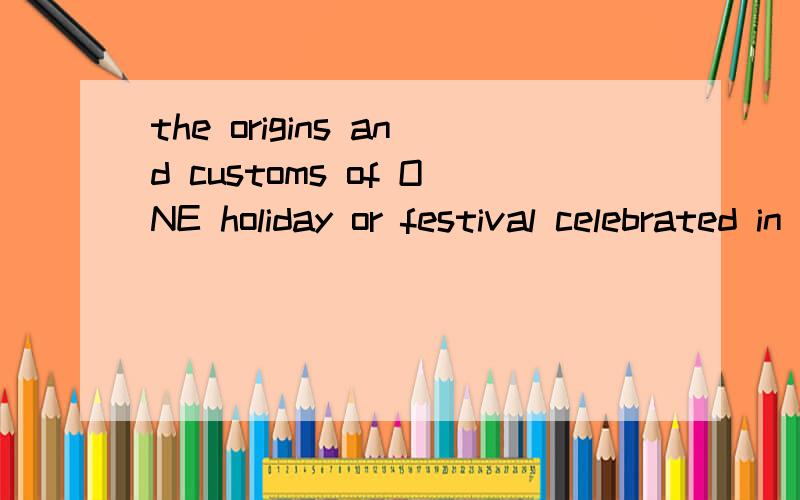the origins and customs of ONE holiday or festival celebrated in China
来源:学生作业帮助网 编辑:作业帮 时间:2024/11/28 12:28:01

the origins and customs of ONE holiday or festival celebrated in China
the origins and customs of ONE holiday or festival celebrated in China
the origins and customs of ONE holiday or festival celebrated in China
Chinese New Year starts with the New Moon(新月)on the first day of the new year and ends on the full moon(满月)15 days later. The 15th day of the new year is called the Lantern Festival(元宵节), which is celebrated at night with lantern displays and children carrying lanterns in a parade.
The Chinese New Year is now popularly known as the Spring Festival because it starts from the Begining of Spring (the first of the twenty-four terms in coodination with the changes of Nature). Its origin is too old to be traced. Several explanations are hanging around. All agree, however, that the word Nian, which in modern Chinese solely means "year", was originally the name of a monster beast that started to prey on people the night before the beginning of a new year.
One legend goes that the beast Nian had a very big mouth that would swallow a great many people with one bite. People were very scared. One day, an old man came to their rescue, offering to subdue Nian. To Nian he said, "I hear say that you are very capable, but can you swallow the other beasts of prey on earth instead of people who are by no means of your worthy opponents?" So, it did swallow many of the beasts of prey on earth that also harrassed people and their domestic animals from time to time.
After that, the old man disappeared riding the beast Nian. He turned out to be an immortal god. Now that Nian is gone and other beasts of prey are also scared into forests, people begin to enjoy their peaceful life. Before the old man left, he had told people to put up red paper decorations on their windows and doors at each year's end to scare away Nian in case it sneaked back again, because red is the color the beast feared the most.
From then on, the tradition of observing the conquest of Nian is carried on from generation to generation. The term "Guo Nian", which may mean "Survive the Nian" becomes today "Celebrate the (New) Year" as the word "guo" in Chinese having both the meaning of "pass-over" and "observe". The custom of putting up red paper and firing fire-crackers to scare away Nian should it have a chance to run loose is still around. However, people today have long forgotten why they are doing all this, except that they feel the color and the sound add to the excitement of the celebration.